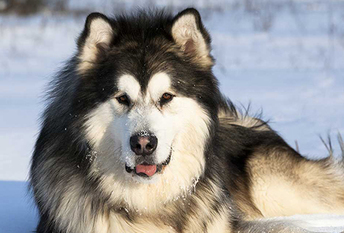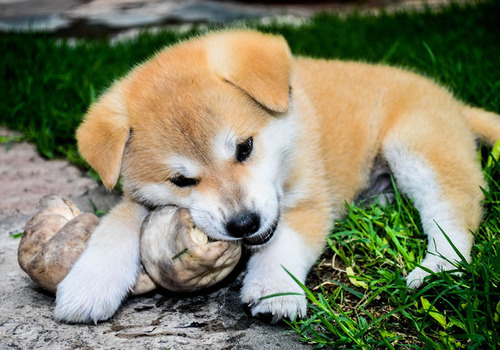Akitas don't require fancy grooming. It's good to brush the double coat weekly to keep it clean and remove dead hair.
During spring and fall shedding seasons, daily brushing will help to keep excess hair under control. In addition, trim his nails as needed, brush his teeth, and keep the ears clean to prevent infections.
This is a smart, strong dog that will appreciatemental and physical exertion every day. In fact, daily exercise should help keep him or her to be well-mannered.
moderate (30 – 50 minutes) to long (60+ minutes) walks
hiking
running/jogging– Akitas are excellent running partners
weight pulling sports
sled pulling
weight pulling
skijoring
dog scootering or carting
games that involve mental challenge:Hide and Seek
training sessions
Akitas have a tendency to suffer from bloat/gastric torsion and as such it's not a good idea to feed them one big meal a day. It's far better to split the amount you feed a dog into two meals and feed them once in the morning and then again in the evening.
Puppies need to be fed a good quality, well-balanced diet and the breeder would have given you their feeding schedule when you picked the puppy up from them. It's essential to keep to a feeding routine when you first get a puppy or you may find they suffer a serious tummy upset. You can change their diet, but this needs to be done gradually over a period of time and if a puppy gets an upset tummy to put them back on their original diet. You should then discuss things with the vet before attempting to change their food again.
Older dogs need to be fed a good quality, well-balanced diet that meets all their nutritional needs. Although Akitas are not known to be fussy eaters, it would be a mistake to put them on a lower quality dog food because it would not contain the right levels of minerals, vitamins and other nutrients a dog needs to remain healthy.
The average life span of the Akita is 10 to 12 years. Akitas can experiencebloat, a sudden, life-threatening condition where the stomach can twist without veterinary intervention.
Bloat is a medical emergency, and Akita owners should learn to recognize the signs. Prospective owners should be sure to work with a reputable breeder who tests his or her breeding stock for health concerns such as eye and thyroid disorders, and hip dysplasia, a malformation of the hip joints that can cause pain and arthritis.
Recommended Health Tests:
A large breed, the Akita needs a strong owner/trainer since it has a strong will and tends to be stubborn. At the first sign of weakness, this dog will assume an alpha attitude over subordinate owners.
An intelligent dog, it doesn’t take long for this breed to pick up on training, which can prove to have positive and negative repercussions. Your Akita will become bored easily, so provide enough mental and physical stimulation.
Akitas work best on a daily routine, so it learns what is expected. As a puppy, start with basic commands, and work your way up to more complex lessons as your dog approaches the age of four to six months.












